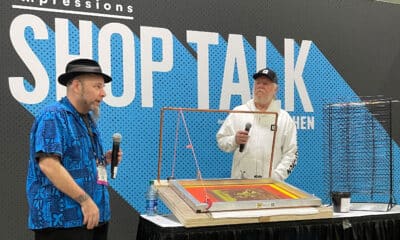
Rockin’ the Perfect Schedule for Your Shop
When it comes to production scheduling, if you’re not early, you’re running late.
Published
2 weeks agoon
IT IS A KNOWN FACT that plenty of shops somehow got their start with an association with music. Typically, one of the band members started making T-shirts, flyers, posters, and stickers to support the band’s marketing. There is an art side to the music industry, which has become a gateway to the print world for many.
Let’s use that as a fun metaphor for building a production schedule for your shop.
The Basics: Who is in the Band?
Every member of a band matters. It doesn’t matter what type of music, if one or more of the band can’t hit the right notes, plays off tempo or out of tune, or can’t make the gig…the band will fail. The same can be true for your shop.
If you’re trying to make “incredible music” with your team, but one or more of them can’t hit those notes, you will have the same challenges. Where is your shop on this subject? This is important because your expectations must align with the professional journey of the staff. Beginning musicians can’t play advanced and complicated music. Even if everyone wants them to, it can be beyond their skill and talent.
People might understand this for music, but they seldom make the connection to professional printing. If you are having trouble keeping to an accurate production schedule, it could be due to the level of employee skill, training, motivation, or other soft-skill factors.
How much time do you spend with your leadership team working on employee development in all facets of your shop? In music, if the lead guitarist can play electrifying solos, but the singer is out of tune and the rhythm section can’t keep a beat, the band might change their music to fit the skill level of all members. What are you doing in your shop?
AdvertisementThe Set List: Building on Accurate Information
Before a rock band hits the stage, the members craft a set list. This guides their performance, as they know what songs they will play in concert and in a particular order. Not only that, but their support crew, with the lighting, sound, and other elements that go into making an amazing live performance, use this set list to understand their roles in creating a fantastic experience for the audience.
Similarly, creating an effective production schedule begins with accurate information. If you consider your printing equipment the “band onstage,” every other person or role in the shop helps it play its best music. The first step in the process is getting the order details correct from the sales order. From a mission-critical point of view, the ship date is the most important information for a production schedule.
Knowing when something needs to leave the building determines the set list for your shop more than anything. This information is how you can determine the priority of orders. In thinking about your orders, do you have a process that uses this key information in all departments for each person to determine what to do next? How can someone in your business immediately know his next task without someone telling him? Also, if you don’t have a production meeting to talk about what you are printing that day, you don’t have this process.
Take a minute and chart everything that goes into making an order happen on schedule. This means in all departments. Any instance that originates from information that might cause a delay should be on the list. Artwork, inventory, and getting everything prepared for production early sets the stage for a fantastic, timely performance by production. And this is how you get your clients cheering for an encore.
Band Rehearsal = Streamlining Processes
Band rehearsal is the time the group spends honing its musical craft. Playing the same song over and over — until it has the muscle memory to perform the song without thinking — is how bands gel and come together. Every note is practiced to perfection. Legendary bands use this time to create something special that makes them memorable. Without the practice time, they wouldn’t sound the same.
Your shop’s processes equate to a band’s rehearsal time. You choreograph each step to ensure a smooth performance. Who is doing what? How long should it take? Exactly when is his part of the order due? If you want an accurate production schedule, this must be honed so every expectation is met. Any challenges or delays must be addressed early to find the answer.
AdvertisementAdopting technology and automating steps acts like an amplifier here by increasing productivity volume. Also true is when you turn up the volume, you make your weakest point more noticeable. Automating anything shows you where you are weakest.
Is your team ready to rock when it needs to be? If not, consider investing more time in rehearsal, also known as processes.
Playing to the Crowd: Get More Applause
Have you ever noticed that great bands always sound better live? When they are on stage rocking their butts off, the music has more energy and typically sounds much better than any recording. Bands thrive on the energy of the crowd to fuel that performance. The cheering, applause, hands in the air like they just don’t care, and smiling faces empower the band to push themselves to achieve more. If you’ve been to a concert by your favorite band, you know what I’m talking about.
You can equate solid Key Performance Indicators (KPIs) with your shop’s applause meter. The data points on things that matter can be like hands clapping. The better the performance of these ideas, the more metaphorically crazier the “audience” would get if it was a concert. If you aren’t doing things right, consider it as the crowd booing. Setting and adjusting these KPIs is like reading the audience. Are you adjusting your set list and experience to keep the crowd happy? Rocking the perfect production schedule for your shop happens when your team is in sync and knows how to play all the correct notes.
To keep “headlining” with your customers, use the idea of applause with your KPIs to get the momentum you need to push forward or the empowerment to make changes. It’s up to you, just like a rock band playing in a stadium full of fans.
The Band Tour: Managing the Workload
Let’s keep the music metaphor going and discuss the band’s world tour. In music, gigs can be from small, intimate clubs to massive stadiums. Each requires a different approach by the band. Handling various order sizes and sales dynamics in your shop may require a tailored strategy to ensure your screen-printing business keeps rocking without missing a beat. Here’s where you build the process to handle solo gigs (small orders) with the same showmanship as sold-out arena shows (large orders). While these gigs (orders) may look the same on paper, they are different experiences, from a profitability standpoint too. A band can say “Yes” to playing anywhere. You can say “Yes” to any type of order.
AdvertisementJust because you can say “Yes” doesn’t mean you should. Considering the amount of money a popular rock band might make with one sold-out stadium show, there must be a compelling reason for the members to say “Yes” to playing in a bar again.
Let’s rephrase that. Not all jobs in your shop are created equal. Some are more profitable and lucrative than others. As my friend Mark Coudray famously says all the time, “Are you busy being busy or busy being profitable?”
Also, bands with good management have their touring schedule booked months, if not years, in advance. Think about your shop. How far out does your lead generation and sales approach push out? If you are not selling eight to 12 weeks ahead of schedule, you may find yourself with unwanted spots on your production schedule that are empty.
Again, this is your sales process. Don’t wait for the phone to ring. Get out there and work the sales challenge by hunting your next string of weeks. It’s your job to fill this up.
Learning a New Instrument
Musical people often are talented enough to play multiple instruments. The guitar player might learn to play the piano. The lead singer may pick up the violin. These innovations for the band give them a new sound and keep them fresh to their audiences.
The same goes for your shop. Right now, software, equipment, consumables, and techniques will allow you to “play better” with what you do in your shop. Are you playing and sounding the same in your shop as in 1987? I ask because sometimes shops get stuck in a rut. Bands inject these new aural ideas into their work to keep things interesting and entertaining. Your shop needs these ideas to be able to be more effective with your time and daily performance.
Consider investing in new equipment can add speed and automation. Can you do some of the tasks you are doing now in half the time? What would that impact have on your production schedule? New software can connect equipment, staff, and even customers to make faster decisions with less effort. Where are you spending your time? What if a good chunk of that disappeared?
New consumables and techniques can allow you to increase quality and effectiveness without sacrificing time spent doing the work. What if your annual error rate was halved?
Of course, some bands never learn to play new instruments or create interesting songs that everyone loves. Those bands are sometimes called “One-Hit Wonders.” Take the time to learn new things. This usually is where growth comes from.
Earning an Encore
At the end of any live performance, bands may earn enthusiastic applause and demands for an encore. This is a testament to how incredible the experience was for the audience. An encore in our industry is repeat, happy customers. When customers return to place another order, you know they like what you are doing.
Here’s the 10 production scheduling secrets for making that happen in your shop:
- Ensure everything is correct going into the system’s order. People need to know what to do without an explanation. If anyone asks you, “Hey, what does this mean?,” it is a sign that you don’t have it right yet.
- The ship date is the most crucial information on the work order. Every person in every department should be able to prioritize his work so that his chunk of what to do is handled on time so the order will leave the building on that date.
- Staff members help others downstream from them and will do whatever it takes to speed up the process.
- Leadership and management invest time and money in getting the correct tools for the job and training the staff to use them.
- The production schedule is public and can be accessed by any team member. It is kept updated with a process. Production is not overbooked.
- All production orders are scheduled to have the production end of things completed one business day before the posted ship date. On the ship date, the only thing that happens is shipping.
- Delays to any order require the ship date to be moved out. This task is handled by the customer service or sales team based on the updated information regarding the order. Customer service and sales are accountable for the customer relationship.
- Capacity is the average of how many. How many units usually are printed, or how many orders typically are produced? Velocity is how fast. Use your average capacity and velocity to build out the standards in your scheduling processes for when jobs can be completed. Use the current averages and place orders on the schedule to the correct equipment and day slot immediately after entering the order into the system.
- Slow down. Double-check your work in every department. Measure twice; cut once. Ensure everything is correct before passing the order downstream to the next department.
- Training is the key. Leadership and management should keep staff accountable with clear expectations on what the right answer is about anything in the process. Any employee in any department should know what he is doing next at any given time of the day without being told.
As bands evolve their sound and style to stay relevant, screen-printing businesses must adapt and innovate to thrive. For production scheduling, if you are not early, you are running late. That’s how you thrill your fans.
Marshall Atkinson is the owner of Atkinson Consulting, LLC, based in Mesa, Arizona. He coaches apparel decoration companies on operational efficiency, continuous improvement, workflow strategy, business planning, employee motivation, management, and sustainability. He is a frequent tradeshow speaker, author, and host of two podcasts, as well as co-founder of the Shirt Lab educational company. He can be reached at marshall@marshallatkinson.com

SPONSORED VIDEO
Let’s Talk About It
Creating a More Diverse and Inclusive Screen Printing Industry
LET’S TALK About It: Part 3 discusses how four screen printers have employed people with disabilities, why you should consider doing the same, the resources that are available, and more. Watch the live webinar, held August 16, moderated by Adrienne Palmer, editor-in-chief, Screen Printing magazine, with panelists Ali Banholzer, Amber Massey, Ryan Moor, and Jed Seifert. The multi-part series is hosted exclusively by ROQ.US and U.N.I.T.E Together. Let’s Talk About It: Part 1 focused on Black, female screen printers and can be watched here; Part 2 focused on the LGBTQ+ community and can be watched here.
You may like
Advertisement

Looking Back at the Early Years of Screen Printing: A Color Separation Showdown

Gildan Donates Surgical Equipment to Mario Catarino Rivas Hospital

INX University Expands Online Curriculum Program
SUBSCRIBE

Bulletins
Get the most important news and business ideas from Screen Printing magazine's news bulletin.
Advertisement
Latest Feeds
Advertisement
Most Popular
-

 Columns1 month ago
Columns1 month ago8 Marketing Mistakes Not to Make When Promoting Your Screen Printing Services Online
-

 Press Releases1 month ago
Press Releases1 month agoSports Inspired Clothing Market: The Influence of Sports on Fashion Forward Looks
-

 Editor's Note1 month ago
Editor's Note1 month agoLivin’ the High Life
-

 Marshall Atkinson1 month ago
Marshall Atkinson1 month agoHow to Create a Winning Culture in Your Screen-Printing Business
-

 Press Releases4 weeks ago
Press Releases4 weeks agoHope Harbor to Receive Donation from BlueCotton’s 2024 Mary Ruth King Award Recipient
-

 Case Studies1 month ago
Case Studies1 month agoScreen Printing for Texture and Depth
-

 News & Trends2 months ago
News & Trends2 months agoWhat Are ZALPHAS and How Can You Serve Them in Your Print Business?
-

 Headlines1 month ago
Headlines1 month agoLive Poster Printing Raises $30K for Charity














